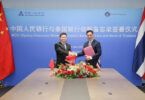Several government departments in Thailand are exploring blockchain technology to streamline processes, and now the country’s Excise Department has also joined the bandwagon. The agency has partnered with Krungthai Bank to use distributed ledger technology (DLT) for tax refunds to oil exporters and prevent VAT fraud in the country.
Patchara Anuntasilpa, Director-General of the Excise Department, said the department would adopt the blockchain-based system by mid-2020, reported Bangkok Post. The legacy system involves paper-based documents for tax refunds, and the inspection is not as thorough as it needs to be, Anuntasilpa added.
Currently, Thailand has a 7% VAT rate for sales of goods and services in the country. Some oil traders claim a tax waiver by furnishing documents of oil export, but sell the same oil in the country without paying the VAT. This creates leakages in the income of the excise department, which it hopes to solve with a blockchain platform.
Meanwhile, refined petroleum is one of its most significant export commodities. In July the country produced 238,000 barrels per day. By comparison, the U.S., Saudi Arabia and Russia produce more than 10 million barrels a day. The Bangkok Post cited a source from the country’s oil trading circles saying the tax exemption for oil exports amounts to 6 billion baht per year ($200 million).
Blockchain could potentially provide the excise department with a clearer picture of the export route, from a refinery to the shipping dock, all the way to the destination country.
Also, with all documents on a blockchain, it becomes easier to verify the trade. In cases where exporters have paid excess tax, the money could be refunded rapidly. It was estimated that a blockchain tax refund system could speed up the process nearly three-fold.
VAT fraud is a major issue in the European Union, and there are calls for it to explore further leveraging technology to plug the losses. Artificial Intelligence (AI) could potentially identify suspicious transactions, and blockchain could provide immutability of data.
Meanwhile, the Thai excise department sees other applications of blockchain. It will initiate three pilots with Krungthai Bank — fuel tax refunds, e-bank guarantees and renewal of distribution licenses for liqueur, tobacco and playing cards. The Letters of Guarantee project involves at least 22 members as part of the Thailand Blockchain Community Initiative.
State-owned Krungthai Bank is already exploring a blockchain cross-border payments system in partnership with Myanmar’s Shwe Rural & Urban development bank.
A few days ago, Thailand’s Ministry of Finance announced three blockchain pilots for tourist VAT refunds, bond issuance and procurement.
Another project is the National Digital Trade Platform (NTDP) for a unified trading platform, initiated by The Joint Standing Committee of Commerce, Industry and Banking (JSCCIB) of Thailand. Ping An’s OneConnect recently demonstrated its blockchain capability for NTDP and Japan’s NTT Data has already completed a trial.







